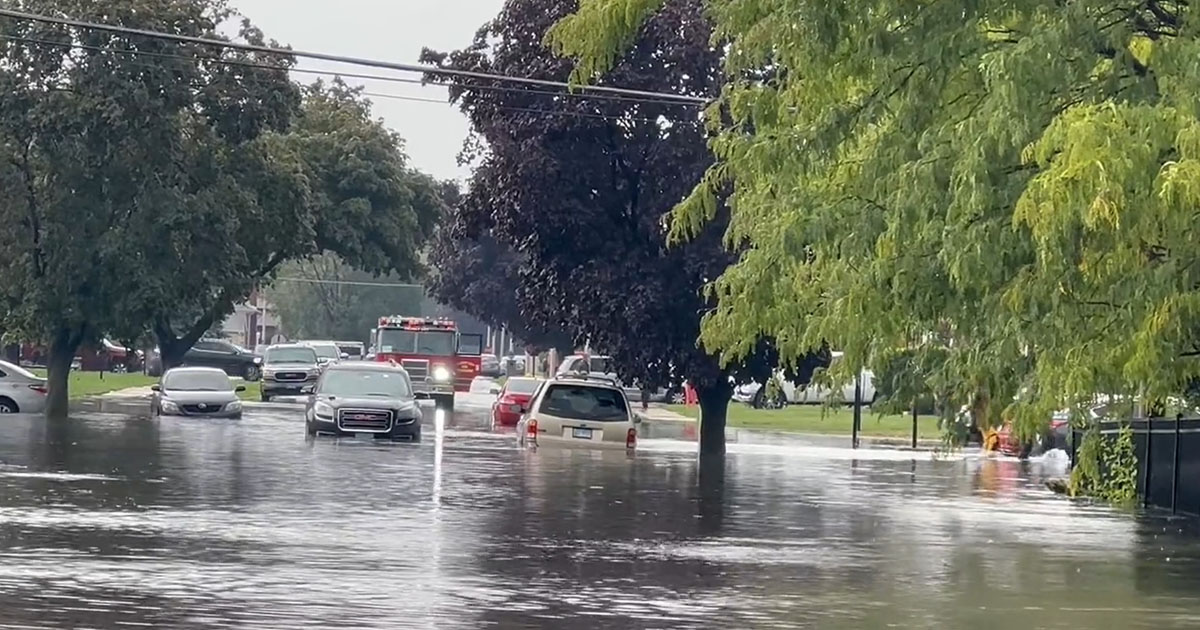CHICAGO (WLS) — Leaders in south suburban Calumet City are asking for help and more funding after flash floods caused a lot of damage on Sunday.
Several inches of rain fell in a short amount of time.
That rain flooded basements and roads.
There are now concerns about the structural integrity of certain buildings.
Calumet City Mayor Thaddeus Jones issued a state of emergency and held an emergency Council meeting Wednesday.During the fiery meeting, aldermen refused to approve $3 million in emergency funds.
However, $1 million was released to help with cleanup.
The city’s engineers have deemed Sunday’s storm a 500-year event after the town’s aging infrastructure took in over 9.5 inches in 2.5 hours.
“We’re going to residents’ houses, restoring their houses and removing the sewer backup that they experienced,” Jones said.
Jones said the Federal Emergency Management Agency was already in the south suburbs, helping homeowners still reeling from flooding in June and July.
“They’ve been here since Thursday giving residents assistance, but now, we’re going to have to apply for additional assistance through the governor to get this taken care of,” Jones said.
He’s asking affected residents to fill out a residential flood form.
Terry Douglas is just one of several long-time residents still cleaning up stormwater Wednesday.
“We try to get the washing machine and dryer dried up and get that fixed. We just got the hot water heater on,” he said.
Homes along Clyde Avenue were among those in neighborhoods hard hit by flooding caused by Sunday rain showers.
Neighboring Burnham and Dolton had flooding, too.
“We’re here to partner with the local municipalities, as we have always done to find solutions to these challenging problems,” Metropolitan Water Reclamation District Commissioner Yumeka Brown said.
But south suburban leaders are also asking for help from the county and the federal government.
Calumet City officials are also hoping to secure the nearly $100 million needed to update or replace their decades-old pipes and sewers.
Antionette Mack, who lost family keepsakes, furniture and other possessions when the basement and crawl space of her home flooded again, said there’s little relief.
“At this point, I’m over it. I’m over it. I want to move to a condo or something,” Mack said.
In a statement Wednesday, the Metropolitan Water Reclamation District of Greater Chicago (MWRD) said:
“With more than six inches of rain falling on Calumet City and neighboring south suburban communities, the Metropolitan Water Reclamation District of Greater Chicago (MWRD) urges continued collaboration, investment and attention to stormwater management and infrastructure.
“Few local sewers have capacity to handle these rain totals and convey this flow to the MWRD’s intercepting sewers and Tunnel and Reservoir Plan (TARP) infrastructure. The MWRD’s Thornton Composite Reservoir, which is part of TARP and serves Chicago south of 87th Street and 13 south suburban communities, including Calumet City, was only at 15 percent capacity after the weekend rainstorm. This means that despite the heavy rains, most of the flow was not reaching the reservoir.
“‘It is imperative that we work together to continue to find ways to improve Cook County local community’s stormwater systems,” said MWRD President Kari K. Steele. “The MWRD works around the clock to manage excess water coming from communities within our 882-square-mile service area. I encourage local officials to reach out to my office to discuss stormwater improvement opportunities with green infrastructure. Together we accomplish more.’
“The TARP system continues to maintain capacity and operate as designed. Since becoming operational in 2015, the Thornton Reservoir has captured more than 53 billion gallons of combined sewage. This is water that would otherwise be discharged to the waterways or flood basements.
“Through the MWRD’s Stormwater Management Program, the MWRD has partnered or is partnering with several south suburban communities on green infrastructure and other stormwater management projects to help alleviate flooding. The MWRD has also distributed more than 2,000 free rain barrels to Calumet City and Dolton residents.
“The MWRD has also worked with these communities through its Watershed Planning Councils, which exist to provide a forum for municipalities to learn about available resources. Meeting locations and dates are listed on the MWRD’s website at mwrd.org/watershed-planning-council-meetings-1.”
Source: https://abc7chicago.com/calumet-city-weather-flooding-flood-fema/13805025/

